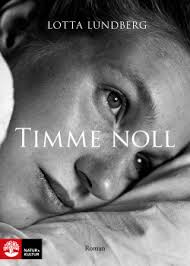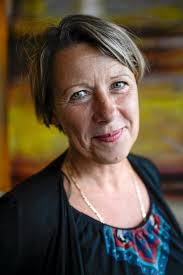Timme noll by Lotta Lundberg, Sweden, 2014
Translated, this book could be called Zero Hour. I have done a few searches, but was unable to find anything that confirmed that the book has actually been translated in to English. It has, however, been translated into German, and as it won Swedish Radio’s Novel Prize for 2015 I would assume that an English translation is on its way.
To be perfectly honest, at the outset I did not like the book. It is made up of three separate stories, each of them with a woman as the central character, and I worked my way through many pages trying to find the links (or even just one link) between the stories. After about 100 pages, I decided that were most probably no links, and I set about appreciating each story on its own merits. Having made this decision, I found that I began to enjoy the book, and by the end was pleased that I had persevered. The three stories are linked, but the links are not always obvious. After my initial scepticism, I decided that it is a book worth reading.
The first story, set in 1945 at the end of the war, introduces us to Hedwig, an author who is trying to find her half-Jewish daughter. At the beginning of the war, she had sent the child off with a group of other children, naively believing that she was doing the right thing. Her priority is her writing; it is not until she is faced with the after-war chaos that she begins to reassess her motives.
The second story concerns Isa, a young girl living in 1980s Uppsala, Sweden. Isa is seeing a psychologist because of aggression and anti-social behaviour, and is trying to create a new world order. She is very dependent on a radio broadcaster known only as the ‘Voice in the Radio’. The third story is about Isa’s psychologist, Ingrid (though we do not realize that she is Isa’s psychologist until more than halfway through the book). It is 2005 and Ingrid has given up her practice and has moved to the Stockholm archipelago with her husband, a priest suffering from the early stages of Parkinson’s Disease. Ingrid’s world is turned upside down when her husband acts completely out of character, and Ingrid has to ask herself what she really wants out of life.

All stories can be related back to the title, Zero Hour – a point when everything stands in ruins and life has to begin again. There is guilt and shame, but there are also small rays of light indicating a more positive, if not happier, future. The book is dedicated to Cordelia Edvardson (author and journalist), who survived Auschwitz and was given refuge in Sweden. What is not at all clear is that Hedwig’s missing daughter and Isa’s ‘Voice in the Radio’ is this Cordelia (referred to in the book only as ‘the girl’). In Edvardson’s autobiographical novel Bränt barn söker sig till elden(Burnt Child Seeks the Fire), she also uses the expression ‘the girl’ in reference to herself; however, if one has not read Edvardson’s book (or read it thirty years ago when it was first published and has since forgotten the nuances), this connection can be completely missed.
I feel that the dilemmas facing the three women in the novel are beautifully described and developed, and even if the reader has never heard of Cordelia Edvardson there is plenty in the novel to inspire thought long after the last page has been turned and the book has been closed.
Photo of Lotta Lundberg from www.hd.se
Photo of Cordelia Edvardson from www.aftonbladet.se

